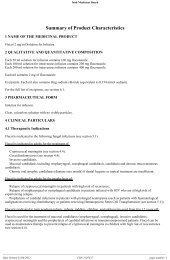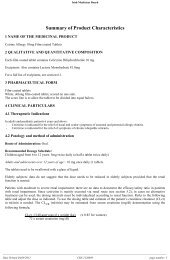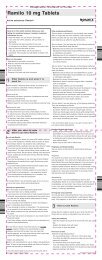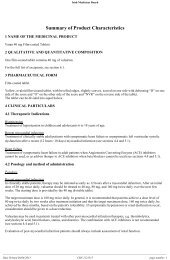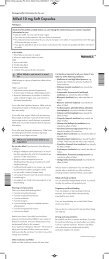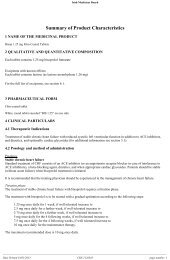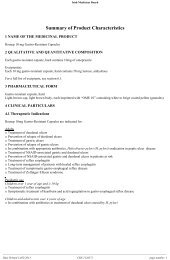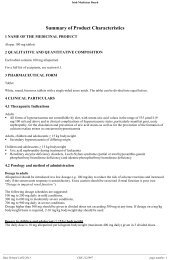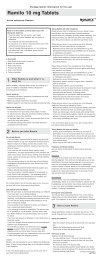Download Cifox 250mg PIL here - Rowex Ltd
Download Cifox 250mg PIL here - Rowex Ltd
Download Cifox 250mg PIL here - Rowex Ltd
You also want an ePaper? Increase the reach of your titles
YUMPU automatically turns print PDFs into web optimized ePapers that Google loves.
<strong>Cifox</strong> 250 <strong>PIL</strong> User testing 08-10_Atecor 25, 50 & 100mg 22/02/2013 14:26 Page 1<br />
PACKAGE LEAFLET: INFORMATION FOR THE USER<br />
Ciprofloxacin (as hydrochloride)<br />
<strong>Cifox</strong> <strong>250mg</strong> Film-Coated Tablets<br />
Read all of this leaflet carefully before you start taking this medicine.<br />
- Keep this leaflet. You may need to read it again.<br />
- If you have any further questions, ask your doctor or pharmacist.<br />
- This medicine has been prescribed for you. Do not pass it on to others. It may harm them, even if their symptoms<br />
are the same as yours.<br />
- If any of the side effects gets serious, or if you notice any side effects not listed in this leaflet, please tell your<br />
doctor or pharmacist.<br />
Code 3760<br />
In this leaflet<br />
1. What <strong>Cifox</strong> is and what it is used for<br />
2. Before you take <strong>Cifox</strong><br />
3. How to take <strong>Cifox</strong><br />
4. Possible side effects<br />
5. How to store <strong>Cifox</strong><br />
6. Further information<br />
1<br />
2<br />
What <strong>Cifox</strong> is and what it is used<br />
for<br />
<strong>Cifox</strong> is an antibiotic belonging to the fluoroquinolone<br />
family. The active substance is ciprofloxacin.<br />
Ciprofloxacin works by killing bacteria that cause<br />
infections. It only works with specific strains of bacteria.<br />
Adults<br />
<strong>Cifox</strong> is used in adults to treat the following bacterial<br />
infections:<br />
• respiratory tract infections<br />
• long lasting or recurring ear or sinus infections<br />
• urinary tract infections<br />
• infections of the testicles<br />
• genital organ infections in women<br />
• gastro-intestinal tract infections and intra-abdominal<br />
infections<br />
• skin and soft tissue infections<br />
• bone and joint infections<br />
• to treat infections in patients with a very low white<br />
blood cell count (neutropenia)<br />
• to prevent infections in patients with a very low white<br />
blood cell count (neutropenia)<br />
• anthrax inhalation exposure<br />
• to prevent infections due to the bacterium Neisseria<br />
meningitidis<br />
If you have a severe infection or one that is caused by<br />
more than one type of bacterium, you may be<br />
given additional antibiotic treatment in addition to <strong>Cifox</strong>.<br />
Children and adolescents<br />
<strong>Cifox</strong> is used in children and adolescents, under<br />
specialist medical supervision, to treat the following<br />
bacterial infections:<br />
• lung and bronchial infections in children and<br />
adolescents suffering from cystic fibrosis<br />
• complicated urinary tract infections, including<br />
infections that have reached the kidneys<br />
(pyelonephritis)<br />
• anthrax inhalation exposure.<br />
<strong>Cifox</strong> may also be used to treat other specific severe<br />
infections in children and adolescents when your doctor<br />
considers this necessary.<br />
Before you take <strong>Cifox</strong><br />
Do not take <strong>Cifox</strong> if you are<br />
- allergic (hypersensitive) to ciprofloxacin or any of the<br />
other ingredients of <strong>Cifox</strong> (See section 6)<br />
- taking tizanidine (see Section 2: Taking other<br />
medicines).<br />
Take special care with <strong>Cifox</strong><br />
Before taking <strong>Cifox</strong><br />
Tell your doctor if you:<br />
• have ever had kidney problems because your<br />
treatment may need to be adjusted<br />
• suffer from epilepsy or other neurological conditions<br />
• have a history of tendon problems during previous<br />
treatment with antibiotics such as <strong>Cifox</strong><br />
• have myasthenia gravis (a type of muscle weakness)<br />
• have heart problems<br />
Caution should be taken when using this kind of<br />
medicine, if you were born with or have family history of<br />
prolonged QT interval (seen on ECG, electrical<br />
recording of the heart), have salt imbalance in the blood<br />
(especially low levels of potasium or magnesium in the<br />
blood), have a very slow heart rhythm (called<br />
‘bradycardia’), have a weak heart (heart failure), have a<br />
history of heart attack (myocardial infarction), you are<br />
female or elderly or you are taking other medicines that<br />
result in abnormal ECG changes (see section<br />
Taking other medicines).<br />
While taking <strong>Cifox</strong><br />
Tell your doctor immediately, if any of the following<br />
occurs during treatment with <strong>Cifox</strong>.<br />
Your doctor will decide whether treatment with <strong>Cifox</strong><br />
needs to be stopped.<br />
• Severe, sudden allergic reaction (an anaphylactic<br />
reaction/shock, angio-oedema). Even with the first<br />
dose, t<strong>here</strong> is a rare chance that you may experience<br />
a severe allergic reaction with the following<br />
symptoms: tightness in the chest, feeling dizzy, feeling<br />
sick or faint, or experience dizziness on standing.<br />
If this happens, tell your doctor immediately<br />
since the administration of <strong>Cifox</strong> will have to be<br />
stopped.<br />
• Pain and swelling in the joints, and tendinitis<br />
may occur occasionally, particularly if you are<br />
elderly and are also being treated with<br />
corticosteroids. At the first sign of any pain or<br />
inflammation stop <strong>Cifox</strong> and rest the painful area.<br />
Avoid any unnecessary exercise as this might<br />
increase the risk of a tendon rupture.<br />
• If you suffer from epilepsy or other neurological<br />
conditions such as cerebral ischemia or stroke, you<br />
may experience side effects associated with the<br />
central nervous system. If this happens, stop taking<br />
<strong>Cifox</strong> and contact your doctor immediately.<br />
• You may experience psychiatric reactions after first<br />
administration of ciprofloxacin. If you suffer from<br />
depression or psychosis, your symptoms may<br />
become worse under treatment with <strong>Cifox</strong>. If this<br />
happens, stop taking <strong>Cifox</strong> and contact your doctor<br />
immediately.<br />
• You may experience symptoms of neuropathy such as<br />
pain, burning, tingling, numbness and/or weakness. If<br />
this happens, stop taking <strong>Cifox</strong> and contact your<br />
doctor immediately.<br />
severe or persistent or you notice that your stool<br />
contains blood or mucus, tell your doctor<br />
immediately. <strong>Cifox</strong> treatment will have to be stopped<br />
immediately as this can be life threatening. Do not<br />
take medicines that stop or slow down bowel<br />
movements.<br />
• Tell the doctor or laboratory staff that you are taking<br />
<strong>Cifox</strong> if you have to provide a blood or urine<br />
sample.<br />
• Ciprofloxacin may cause liver damage. If you notice<br />
any symptoms such as loss of appetite, jaundice<br />
(yellowing of the skin), dark urine, itching, or<br />
tenderness of the stomach, stop taking <strong>Cifox</strong> and<br />
contact your doctor immediately.<br />
• Ciprofloxacin may cause a reduction in the number of<br />
white blood cells and your resistance to infection<br />
may be decreased. If you experience an infection<br />
with symptoms such as fever and serious deterioration<br />
of your general condition, or fever with local infection<br />
symptoms such as sore throat/pharynx/mouth or<br />
urinary problems you should see your doctor<br />
immediately. A blood test will be taken to check<br />
possible reduction of white blood cells<br />
(agranulocytosis). It is important to inform your doctor<br />
about your medicine.<br />
• Tell your doctor if you or a member of your family is<br />
known to have a deficiency in glucose-6-phosphate<br />
dehydrogenase (G6PD), since you may experience a<br />
risk of anaemia with ciprofloxacin.<br />
• Your skin becomes more sensitive to sunlight or<br />
ultraviolet (UV) light under treatment with<br />
ciprofloxacin. Avoid exposure to strong sunlight or<br />
artificial UV light such as sunbeds.<br />
Taking other medicines<br />
Please tell your doctor or pharmacist if you are taking or<br />
have recently taken any other medicines, including<br />
medicines obtained without a prescription.<br />
You must tell your doctor if you are taking other<br />
medicines that can alter your heart rhythm: medicines<br />
that belong to the group of anti-arrhythmics (e.g.<br />
quinidine, hydroquinidine, disopyramide, amiodarone,<br />
sotalol, dofetilide, ibutilide), tricyclic antidepressants,<br />
some antimicrobials (that belong to the group of<br />
macrolides), some antipsychotics.<br />
Do not use <strong>Cifox</strong> together with tizanidine, because<br />
this may cause side effects such as low blood pressure<br />
and sleepiness (see Section 2: "Do not take <strong>Cifox</strong> if<br />
you are").<br />
The following medicines are known to interact with <strong>Cifox</strong><br />
in your body. (Using <strong>Cifox</strong> together with these medicines<br />
can influence the therapeutic effect of these medicines. It<br />
can also increase the probability of experiencing side<br />
effects).<br />
Tell your doctor if you are taking:<br />
• warfarin or other oral anti-coagulants (to thin the<br />
blood)<br />
• probenecid (for gout)<br />
• methotrexate (for certain types of cancer, psoriasis,<br />
rheumatoid arthritis)<br />
• theophylline (for breathing problems)<br />
• tizanidine (for muscle spasticity in multiple sclerosis)<br />
• clozapine (an antipsychotic)<br />
• ropinirole (for Parkinson’s disease)<br />
• phenytoin (for epilepsy)<br />
• metoclopramide (for nausea)<br />
• ciclosporin (medicine used to prevent rejection)<br />
• omeprazole (for stomach ulcers)<br />
• sildenafil (for erectile problems)<br />
• glibenclamide (for diabetes)<br />
• duloxetine (for mood disorders)<br />
• lidocaine (lacal pain reliever)<br />
• medicines known to prolong the QT-interval<br />
<strong>Cifox</strong> increases the levels of the following medicines in<br />
your blood:<br />
• pentoxifylline (for circulatory disorders)<br />
• caffeine<br />
Some medicines may reduce the effect of <strong>Cifox</strong> tablets.<br />
Tell your doctor if you take or wish to take<br />
• antacids<br />
• sucralfate<br />
• a polymeric phosphate binder (sevolamer)<br />
• medicines or mineral supplements containing calcium,<br />
magnesium, aluminium or iron<br />
If these preparations are essential, take <strong>Cifox</strong> about two<br />
hours before or no sooner than four hours after them.<br />
Taking <strong>Cifox</strong> with food and drink<br />
Unless you take <strong>Cifox</strong> during meals, do not eat or drink<br />
any dairy products (such as milk or yoghurt) or drinks<br />
with added calcium when you take the tablets, as they<br />
may affect the absorption of the active substance.<br />
Pregnancy and breast-feeding<br />
Ask your doctor or pharmacist for advice before taking<br />
any medicine.<br />
It is preferable to avoid the use of <strong>Cifox</strong> during<br />
pregnancy. Tell your doctor if you are planning to get<br />
pregnant.<br />
Do not take <strong>Cifox</strong> during breast-feeding because<br />
ciprofloxacin is excreted in breast milk and can be<br />
harmful for your child.<br />
Driving and using machines<br />
<strong>Cifox</strong> may make you feel less alert. Some neurological<br />
adverse events can occur. T<strong>here</strong>fore, make sure you<br />
know how you react to <strong>Cifox</strong> before driving a vehicle or<br />
operating machinery. If in doubt, talk to your doctor.<br />
Code 3760<br />
• Diarrhoea may develop while you are on<br />
antibiotics, including <strong>Cifox</strong> or even several weeks<br />
after you have stopped using them. If it becomes continued on the next page >>
<strong>Cifox</strong> 250 <strong>PIL</strong> User testing 08-10_Atecor 25, 50 & 100mg 22/02/2013 14:26 Page 2<br />
3<br />
How to take <strong>Cifox</strong><br />
Your doctor will explain to you exactly how much <strong>Cifox</strong><br />
you will have to take as well as how often and for how<br />
long. This will depend on the type of infection you have<br />
and how bad it is.<br />
Tell your doctor if you suffer from kidney problems<br />
because your dose may need to be adjusted.<br />
Treatment usually lasts between 5 and 21 days, but may<br />
be longer for severe infections. Take the tablets exactly<br />
as your doctor has told you. Ask your doctor or<br />
pharmacist if you are not sure how many tablets to take<br />
and how to take <strong>Cifox</strong>.<br />
a. Swallow the tablets with plenty of fluid. Do not chew<br />
the tablets because they do not taste nice.<br />
b. Try to take the tablets at around the same time every<br />
day<br />
c. You can take the tablets at mealtimes or between<br />
meals. Any calcium you take as part of a meal will not<br />
seriously affect the uptake. However, do not take <strong>Cifox</strong><br />
with dairy products such as milk or yoghurt or with<br />
fortified fruit juices (e.g. calcium-fortified orange juice).<br />
Remember to drink plenty of fluids while you are taking<br />
<strong>Cifox</strong>.<br />
If you take more <strong>Cifox</strong> than you should<br />
- If you take more than the prescribed dose, get medical<br />
help immediately. If possible take your tablets or the<br />
box with you to show the doctor.<br />
If you forget to take <strong>Cifox</strong><br />
Take the normal dose as soon as possible and then<br />
continue as prescribed. However, if it is almost time for<br />
your next dose, do not take the missed dose and<br />
continue as usual. Do not take a double dose to make up<br />
for the forgotten dose. Be sure to complete your course<br />
of treatment.<br />
If you stop taking <strong>Cifox</strong><br />
It is important that you finish the course of treatment,<br />
even if you begin to feel better after a few days. If you<br />
stop taking this medicine too soon, your infection may not<br />
be completely cured and the symptoms of the infection<br />
may return or get worse. You might also develop<br />
resistance to the antibiotic.<br />
If you have any further questions on the use of this<br />
product, ask your doctor or pharmacist.<br />
4<br />
Possible side effects<br />
Like all medicines, <strong>Cifox</strong> can cause side effects, although<br />
not everybody gets them.<br />
If any of the side effects gets serious, or if you notice any<br />
side effects not listed in this leaflet, please tell your<br />
doctor or pharmacist.<br />
Common side effects (between 1 and 10 in every 100<br />
people are likely to get these)<br />
- nausea, diarrhoea<br />
- joint pain in children<br />
Uncommon side effects (between 1 and 10 in every<br />
1,000 people are likely to get these):<br />
- fungal superinfections<br />
- a high concentration of eosinophils, a type of white<br />
blood cell, increased or decreased amounts of a<br />
blood clotting factor (thrombocytes)<br />
- loss of appetite (anorexia)<br />
- hyperactivity, agitation,<br />
- headache, dizziness, sleeping problems, taste<br />
disorders,<br />
- vomiting, abdominal pain, digestive problems such as<br />
stomach upset (indigestion/heartburn), wind<br />
- increased amounts of certain substance in the blood<br />
(transaminases and/or bilirubin)<br />
- rash, itching, hives<br />
- joint pain in adults<br />
- poor kidney function<br />
- pains in your muscles and bones, feeling unwell<br />
(asthenia), fever<br />
- increase in blood alkaline phosphatase (a certain<br />
substance in the blood)<br />
Rare side effects (between 1 and 10 in every 10,000<br />
people are likely to get these):<br />
- inflammation of the bowel (colitis) linked to antibiotic<br />
use (can be fatal in rare cases) (see Section 2: Take<br />
special care with <strong>Cifox</strong>)<br />
- changes to the blood count (leukopenia, l eukocytosis,<br />
neutropenia, anaemia)<br />
- allergic reaction, allergic swelling (oedema), rapid<br />
swelling of the skin and mucous membranes (angiooedema)<br />
- increased blood sugar (hyperglycemia)<br />
- confusion, disorientation, anxiety reaction, strange<br />
dreams, depression or hallucinations,<br />
- pins and needles, unusual sensitivity to stimuli of the<br />
senses, decreased skin sensitivity, tremors, seizures (see<br />
section 2) or giddiness<br />
- eyesight problems<br />
- expansion of the blood vessels (vasodilation), low<br />
blood pressure<br />
- tinnitus, loss of hearing, impaired hearing<br />
- rapid heartbeat (tachycardia)<br />
- shortness of breath including asthmatic symptoms<br />
- liver disorders, jaundice (cholestatic icterus) or<br />
hepatitis,<br />
- sensitivity to light (see Section 2: Take special care<br />
with <strong>Cifox</strong>),<br />
- muscle pain, inflammation of the joints, increased<br />
muscle tone, cramping<br />
- kidney failure, blood or crystals in the urine (see<br />
Section 2: Take special care with <strong>Cifox</strong>), urinary tract<br />
inflammation<br />
- fluid retention or excessive sweating<br />
- abnormal levels of a clotting factor (prothrombin)<br />
increased levels of the enzyme amylase<br />
- death of liver cells (liver necrosis) very rarely leading<br />
to life-threatening liver failure<br />
- small, pin-point bleeding under the skin (petechiae)<br />
- various skin eruptions or rashes (e.g. the potentially<br />
fatal Stevens-Johnson syndrome or toxic epidermal<br />
necrolysis)<br />
- muscle weakness, tendon inflammation, tendon<br />
rupture, especially of the large tendon at the back of<br />
the ankle (Achilles tendon), worsening of the symptoms<br />
of myasthenia gravis (see Section 2: Take special care<br />
with <strong>Cifox</strong>)<br />
Frequency not known (cannot be estimated from the<br />
available data):<br />
- troubles associated with the nervous system such as<br />
pain, burning, tingling, numbness and/or weakness in<br />
extremities<br />
- abnormal fast heart rhythm, life-threatening irregular<br />
heart rhythm, alteration of the heart rhythm (called<br />
‘prolongation of QT interval’, seen on ECG, electrical<br />
activity of the heart)<br />
- increase in international normalised ratio (INR) in<br />
patients taking Vit K antagonists<br />
5<br />
6<br />
How to store <strong>Cifox</strong><br />
Do not store above 25˚C.<br />
Store in the original package in order to protect from<br />
light.<br />
Keep out of the reach and sight of children.<br />
Do not use <strong>Cifox</strong> after the expiry date which is stated on<br />
the carton and blister after EXP. The expiry date refers to<br />
the last day of that month.<br />
Medicines should not be disposed of via wastewater or<br />
household waste. Ask your pharmacist how to dispose of<br />
medicines no longer required. These measures will help<br />
to protect the environment.<br />
Further Information<br />
What <strong>Cifox</strong> contains<br />
- The active substance is ciprofloxacin (as<br />
hydrochloride)<br />
- Each film-coated tablet contains 250 mg ciprofloxacin<br />
(as hydrochloride)<br />
- Tablet core: croscarmellose sodium, sodium starch<br />
glycollate (type A), microcrystalline cellulose,<br />
magnesium stearate, povidone, colloidal anhydrous<br />
silica, stearic acid.<br />
- Film-coating: Hypromellose, macrogol 6000,<br />
titanium dioxide (E171) and talc.<br />
What <strong>Cifox</strong> looks like and contents of the pack<br />
<strong>Cifox</strong> <strong>250mg</strong> film-coated tablets are white, round, scored<br />
on one side, embossed with ‘cip 250’.<br />
<strong>Cifox</strong> <strong>250mg</strong> film-coated tablets are packed into<br />
PVC/aluminium or PP/Aluminium blisters and are<br />
available in pack sizes of 10, 20 and 100 film coated<br />
tablets.<br />
Not all pack sizes may be marketed.<br />
Marketing Authorisation Holder and Manufacturers<br />
Marketing Authorisation Holder:<br />
<strong>Rowex</strong> <strong>Ltd</strong>, Bantry, Co Cork, Ireland<br />
Manufacturers:<br />
Salutas Pharma GmbH, Otto-von-Guericke Allee 1,<br />
39179 Barleben, Germany.<br />
Rowa Pharmaceuticals <strong>Ltd</strong>., Bantry, Co Cork, Ireland<br />
This leaflet was last approved in October 2010.<br />
Advice/medical education<br />
Antibiotics are used to cure bacterial infections. They are<br />
ineffective against viral infections. If your doctor has<br />
prescribed antibiotics, you need them precisely for your<br />
current illness. Despite antibiotics, some bacteria may<br />
survive or grow. This phenomenon is called resistance:<br />
some antibiotic treatments become ineffective. Misuse of<br />
antibiotics increases resistance. You may even help<br />
bacteria become resistant and t<strong>here</strong>fore delay your cure<br />
or decrease antibiotic efficacy if you do not respect<br />
appropriate:<br />
- dosage<br />
- schedules<br />
- duration of treatment<br />
Consequently, to preserve the efficacy of this drug:<br />
1 - Use antibiotics only when prescribed.<br />
2 - Strictly follow the prescription.<br />
3 - Do not re-use an antibiotic without medical<br />
prescription, even if you want to treat a similar<br />
illness.<br />
4 - Never give your antibiotic to another person;<br />
maybe it is not adapted to her/his illness.<br />
5 - After completion of treatment, return all unused<br />
drugs to your chemist’s shop to ensure they will be<br />
disposed of correctly<br />
I.M. L/33a 02-13<br />
46105171<br />
Very rare side effects (less than 1 in every 10,000<br />
people are likely to get these):<br />
- a special type of reduced red blood cell count<br />
(haemolytic anaemia); a dangerous drop in a type of<br />
white blood cell (agranulocytosis) a drop in the<br />
number of red and white blood cells and platelets<br />
(pancytopenia), which may be fatal, bonemarrow<br />
depression which may also be fatal (see Section 2:<br />
Take special care with <strong>Cifox</strong>)<br />
- severe allergic reaction (anaphylactic reaction,<br />
anaphylactic shock), serum sickness which can be fatal<br />
(see Section 2: Take special care with <strong>Cifox</strong>)<br />
- mental disturbances (psychotic reactions) (see Section<br />
2: Take special care with <strong>Cifox</strong>)<br />
- migraine, disturbed coordination, unsteady walk (gait<br />
disturbance), pressure on the brain (intracranial<br />
pressure)<br />
- disorder of sense of smell (olfactory disorders)<br />
- visual colour distortions<br />
- inflammation of the wall of the blood vessel (vasculitis)<br />
- pancreatitis



